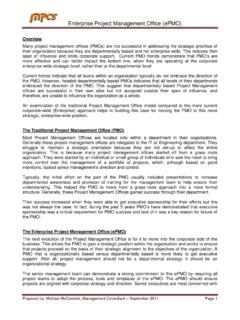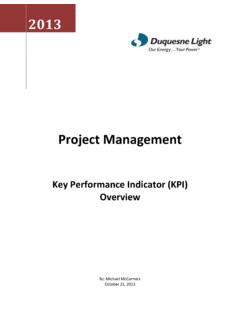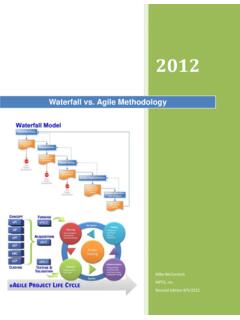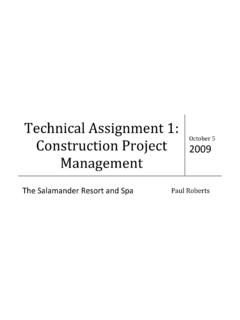Transcription of Construction Contractor Selection Criteria
1 Construction Contractor Selection Criteria Prepared by: Michael McCormick, Management Consultant October 2010 Page 1 This is easier to say than to do. Every client needing to build or renovate is faced with trying to assemble the best design and Construction team. They usually hire the design team first and do so with a qualifications based Selection . For a variety of reasons (schedule being the most common), the Contractor Selection is increasingly being made based on something other than a low bid. The question is what to use as the basis of the Contractor Selection . Best value bid or qualifications based Selection ? When the Contractor Selection is based on something other than a low bid, the first question is should the Client owner make their Contractor Selection based on a process that includes some weighting of the total Construction cost , or not? Best value bid: If the answer is yes, to include the total cost of Construction as part of the Contractor Selection Criteria , then the type of Selection being referred to is increasingly being called a best value bid.
2 About half of the industry would refer to it as a variation of the design-bid-build delivery method, and the other half would refer to it as type of Construction management at-risk. Using a best value bid approach involves a host of challenges for the Client owner including: What information will be used by the Contractor in estimating the total Construction cost ? When should the Contractor be hired? How complete should the design be at the time of Contractor Selection ? How much weight should be put on the total Construction cost ? Will the contract be a lump sum or not-to-exceed price? Are changes likely after the Contractor Selection ? How are contingencies and potential cost savings handled? There are risks associated with each of these issues. There are also proven approaches that are available to mitigate the risks associated with each of these challenges. Qualifications based Selection (QBS): If the answer is not to include the total cost of Construction as part of the Contractor Selection Criteria , then the type of Selection is considered to be a qualifications based Selection (QBS).
3 If there were no element of price, then many would refer to this as a pure qualifications based Selection . However, it is important to note that even when a Contractor s fees and/or general conditions are part of the Selection , if the total Construction costs are not, the industry would still refer to the Selection as a qualification based Selection . Construction Contractor Selection Criteria Prepared by: Michael McCormick, Management Consultant October 2010 Page 2 Lessons learned on Contractor Selection : For many, learning how to select a Contractor on something other than the objective Criteria of low price presents a new set of challenges. They are now faced with how to evaluate the subjective Criteria such as the Contractor s past performance and their team s experience. Which Criteria should be used? How much should it be weighted? How should it be scored? Who should participate in the evaluation and when?
4 They now face the challenge of how to buy value. The good news is that there is extensive experience available in the industry now on this subject. Most owners use a multistep process including a request for qualifications (RFQ), a short listing, a request for proposals (RFP), another short listing, an interview and a final evaluation and Selection . There are numerous examples and recommended practices available for each of these steps. There are several lessons learned that every owner could benefit from when they are using a qualifications based Contractor Selection to buy value. These include: Recognize that the Criteria you will be evaluating at each step will change: At the RFQ stage, your focus may be more on the qualifications of the firms. Once you have used these Criteria and short listed your firms, then all of the firms will have met these Criteria and you will need these Criteria for your RFP and likely even more refined Criteria for your interview and final evaluation steps.
5 Use a Selection committee: In order to ensure that the Selection process is fair; using a committee of three or five people is recommended. Involve a diverse group including a representative from the user group and the Client operations group, if appropriate. Shortlist more than once: taking the time to evaluate competing firm s submittals after each step and eliminating firms that are clearly not looking like they will be seriously considered for Selection is appreciated by all parties. Competing firms would rather be saved the time and trouble of going through any more steps than necessary after it has already been determined that they are really no longer viable candidates. Have a plan and share it: Have whoever is managing your Contractor Selection put together a timeline for the entire Selection process and, if possible, identify key dates such as planned dates for short listing and interviews.
6 Share the plan with competing firms (and your own Selection committee) and stick to it if at all possible. Identify the evaluation Criteria for each step: This is probably the hardest thing to do when trying to select any firm identify the Criteria that you plan to use for the evaluation ahead of time. The best advice I have seen is to list all of the potential Criteria and prioritize the list into three categories 1) very important, 2) important and 3) not important. Then, challenge why you would need any more than just the very important category Criteria to make your decision. Industry practice is to at least list your Selection Criteria in order of importance. With extensive experience and confidence, some owners are comfortable in sharing not only the relative Construction Contractor Selection Criteria Prepared by: Michael McCormick, Management Consultant October 2010 Page 3 importance of each criterion, but also how each will be scored and used to factor into each decision.
7 Weighting of final Selection Criteria : The weighting of the Criteria for each short listing step is difficult enough, but it is easy compared to deciding on the weighting of the Criteria to be used for final Selection . The reason is because this is when one firm is going to be awarded the project, and all others will not. The perfect guide on how to select which criterion to use and how much to weight each criterion has yet to be developed. The best advice here is to ask yourself the question, What would cause me to not only pay a 5 10 percent premium for one firm over another, but also feel confident that I could explain to someone why I did? The answer(s) to this question will vary on every project, but these answers will probably not only be the Criteria you want to include in your final Selection , but they will likely be the ones you want to weight the most. An example might be on a project with an aggressive schedule and a significant penalty if it is not available for occupancy by a date certain.
8 In such a project, the firm and their team s proven ability to meet aggressive schedules is likely to be one of your heavily weighted Criteria for final Selection . It will likely be more important than their proposed fees. Learning to buy value can be a challenge, especially for those who have only used a low bid price to select their contractors. The key to using a qualification based Selection process is to use the experience of those who have served on Selection committees and gone through the process numerous times before to help anticipate how the entire process is likely to go. With the benefit of this planning, successfully implementing a Selection process of a Contractor that will add the most value can be accomplished successfully by almost anyone. Selecting a General Contractor : In most cases, the contract with the general Contractor may be the single largest item in the development budget!
9 A Contractor can bring a project in on time and under budget, saving time and money, but can also be responsible for long delays and cost over-runs, costing time and money. In addition to being responsible for the Construction of the building, the Contractor is responsible for coordinating, supervising; and paying all subcontractors; ordering equipment and materials; submitting paperwork associated with payment requests; and site security. The success or failure of a project can rest on the skill of the Contractor . It is critical to carefully select an experienced Contractor and to hire an attorney experienced with Construction contracts to negotiate on your behalf. In selecting a Contractor to meet your organization s expectations and project demands, it is important that you consider the overall size, experience and business approach possessed by each candidate. Your organization should choose the Contractor that has performed well on similar projects, and brings to the project the optimum balance of experience, positive references and working chemistry.
10 Decide on the Selection Process and Type of Contract: The architect and project manager are best suited to assist you in prequalifying several contractors by looking at: The reputation and relevant experience of the Contractor and team members. Construction Contractor Selection Criteria Prepared by: Michael McCormick, Management Consultant October 2010 Page 4 The Contractor s experience working with nonprofit organizations. The budget-and-schedule track record of the Contractor as confirmed by references. Evidence of repeat clients as well as the Contractor s recent project history. The proposed Construction monitoring process. The quality and durability of the Contractor s work. Decide whether to competitively bid the project or choose a general Contractor early to work with your architect to provide a guaranteed maximum Price contract (see below). Competitively bidding usually means securing the best pricing, but not always.








